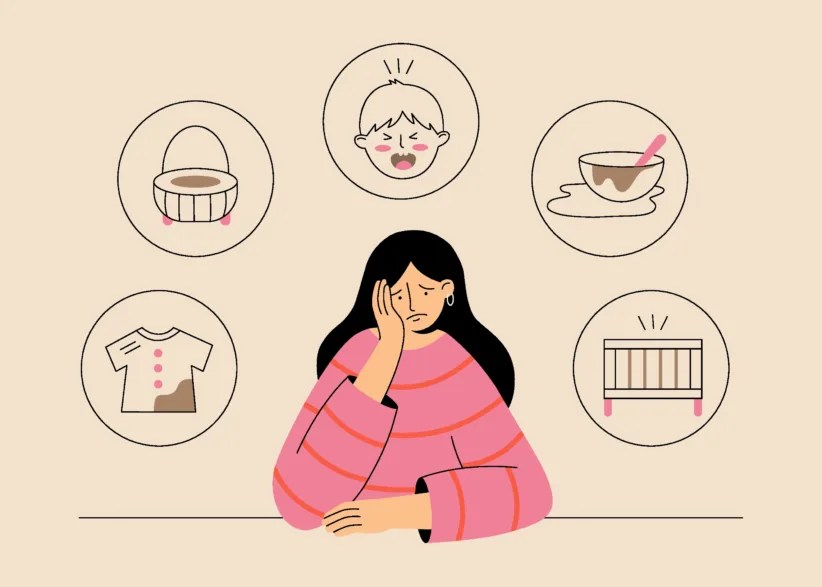
The Baby Blues, Mom Stress or Something More? (expert tips on coping mechanisms and when therapy may be the next step)
When my youngest was a little over a year old, I went for my annual medical and shared with my doctor that I was losing my hair and felt deep bouts of sadness and stress. I explained that my son was adopted, so I could not be going through postpartum.
My doctor let out a bit of a gasp.” You don’t have to give actual birth to feel these stresses,” she shared. I found out later that what I was feeling was called Adoption Depression, essentially the postpartum term for when you adopt. Time has passed since that doctor visit, and I have learned whether you call it the baby blues or postpartum depression when we are in the throes of it, many of us tend to dismiss it as part of the norm of being a new parent or having a newborn. Sure, a learning curve is involved when having a new human to care for while carrying your family, working, and balancing life. But when is it more? When do you need to talk to someone, get out with friends, or seek professional help such as therapy?
We connected with Jessica Alonso, a Licensed Clinical Social Worker and therapist at Two Chairs who helps clients deal with their challenging feelings safely and practically. She thinks it’s crucial for all of us, especially new moms, to lean on our community during rough times and significant life changes.
Psst…Your Neurodiverse Child’s Dental Visit: An Expert Shares Guidance
What are some signs that the anxiety and depression a mom is feeling is more than typical stress or “baby blues”?
While it is definitely expected that one would feel a certain amount of stress associated with becoming a parent, particularly a mother, there are particular indicators that signal that a mom is struggling with more than the adjustment of becoming a parent to a newborn. Some of the signs and symptoms that may indicate a need for additional evaluation and assistance are a mother who is experiencing intrusive and repetitive thoughts about harm coming to her baby, while also engaging in avoidance behaviors to minimize the perceived threat to their child and in order to minimize being triggered. Many women will also display a great deal of guilt and shame surrounding these intrusive thoughts and may become so preoccupied within their own fear and apprehension, that they may report finding it difficult to bond with their child. Women may exhibit a number of signs of postpartum mental health decline, such as becoming very labile, an increased sense of hyper-vigilance, poor self-care, social isolation, not allowing others to engage with the child, and an overall decline in their baseline functioning.
How can a parent who is feeling anxiety and overwhelming stress ask family members, including their partner, for understanding and support?
The fact is that being a new parent brings an indescribable amount of joy, along with a daunting amount of responsibility and exhaustion. It can be extremely difficult to think clearly when running on little to no sleep. That said, it can be beneficial for a new mom to keep a notepad around in order to jot down some bullet points of things that she may need assistance with (i.e. meal prep, house cleaning, extra support for sleep, assistance paying bills, etc…). Additionally, engaging in more frequent conversations with a partner, family, and friends can help “demystify” a new mother’s heightened levels of stress, while anchoring and normalizing her experiences, especially if she has other moms in her circle that can serve as a sounding board or point of reference.
What key signs indicate a mom’s next step is therapy?
If a new mom finds that she is experiencing difficulty with repetitive, intrusive, distressing and debilitating thoughts re: her child’s safety and often finds herself engaged in avoidance behaviors for her child’s perceived safety and/or to avoid being “triggered” herself, this may be a good indicator that additional support in the form of therapy may be needed or indicated. In addition, if a new mom is exhibiting a continued and progressive decline in her ability to perform her self-care, she may inadvertently be asking for additional help that may come in the form of therapy.
What role does a supportive network play when dealing with anxiety?
A supportive network plays a critical role for all individuals and especially for new parents. Having a supportive network in place serves as a safety net and allows for a new mom to feel more comfortable asking for help, voicing any worries or concerns that she may be encountering, assists in preventing feelings of isolation, and provides ideas and perspective to new parents.
What are some expert advice on coping strategies or techniques for dealing with anxiety and depression when in the throes of motherhood?
As a recent first time mom myself, I think it is so important to remember that there is no such thing as a “perfect” parent nor is there a handbook provided “upon discharge” from the hospital or birthing center. It is important to remind yourself that you’re doing the best that you can and to practice self-love and grounding techniques as often as possible (this includes remembering to breathe deeply and to go outdoors for some fresh air and sunlight, as often as possible).
Making time not only for yourself, but to reconnect with your spouse and/or partner is critical too. This allows for open dialogue, emotional reconnection, and an awareness surrounding each other’s feelings, concerns, and needs. And lastly, remembering that support is available to you, should you need it and that you are most definitely not alone is a must! There are quite literally organizations world-wide dedicated to providing support to parents in the postpartum period (free of charge & 24/7), such as PSI – Postpartum Support International. It takes a village to raise a child, so reach out to your “village members” if/when you feel the need.
About our expert:

Jessica Alonso is a Licensed Clinical Social Worker and therapist at Two Chairs in Miami. She enjoys working with clients to identify their personal strengths as well as assisting them in finding relief from their distressing symptoms in a safe and solution-focused manner. Jessica’s motivation for helping clients is rooted in her strong belief that we all need help from our community during stressful periods and transitions throughout our life. She has her Perinatal Mental Health certification and practices many modalities of therapy including systems theory therapy, cognitive behavioral therapy, and mindfulness therapy.



















